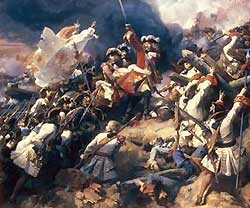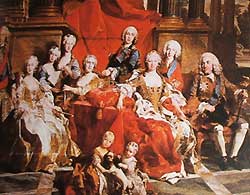Valencia Under the Bourbons
War of Succession and "Enlightened Despotism"
18th century
 In
1701 the last Habsburg King of Spain Charles II died, sparking off a succession
conflict between the Bourbons of France and the Habsburgs of Austria.
Valencia sided with the French at first but when the Austrian forces arrived
in 1705 they switched allegiance. Unfortunately for Valencia, the Austrians
were defeated in 1707. In
1701 the last Habsburg King of Spain Charles II died, sparking off a succession
conflict between the Bourbons of France and the Habsburgs of Austria.
Valencia sided with the French at first but when the Austrian forces arrived
in 1705 they switched allegiance. Unfortunately for Valencia, the Austrians
were defeated in 1707.
As soon as he was in power, Philip V issued a decree of Nueva Planta
- the New Beginning, boldly justifying it with "right of conquest".
Valencia was stripped of all its autonomy, the
Furs (Valencia's own laws on which the city was resting) were annulated
and all municipal affairs were placed into hands of herediatry noble lineages,
appointed by the King. Much of the Valencian nobility was exiled and replaced
by King-appointed nobility from Castilla. Valencia was occupied by a large
military contingent. A citadel was built by the Convento
Santo Domingo, with cannons turned to face the city, and even La
Lonja was turned into barracks for half a century.
It wasn't as much a punitary act against Valencia for her betrayal during
the War of Succession. Rather, it was a policy Phillip V implemented throughout
Spain, forging his rule of "enlightened despotism".
This was the end of Valencian Autonomous Community. Valencia remained
just another Spanish city until the second
half of XX century.
 The
XVIII century was the Age of Enlightenment under the francophilia of the
Bourbons and once again, just like in Rennaisance,
Valencia found itself on the forefront as one of the outposts of the modern
thought. However, the Inquisition was still strong and the diffusion of
new ideas took place mainly through high society salons. The
XVIII century was the Age of Enlightenment under the francophilia of the
Bourbons and once again, just like in Rennaisance,
Valencia found itself on the forefront as one of the outposts of the modern
thought. However, the Inquisition was still strong and the diffusion of
new ideas took place mainly through high society salons.
The Royal Economic Society of Friends of the Region of Valencia, founded
in 1776, was, for example, the most energetic of all Enlightenment institutions
of Spain, tirelessly introducing new ideas of agriculture, sicence and
indsutry, through an effective system of commisions and competitions.
Science and culture boomed in the universities of Valencia, echoing all
across Spain. Particularly flourishing were the arts and Valencia, once
again, became one of the art capitals of the Iberic Peninsula.
The economy boomed with a newly found industry in Valencia - the silk
production. Silk rapidly became a huge enterprise for the whole city,
even promting the creation of the Royal Academy of Art dedicated totally
to silk art. This trade in luxuries brought much wealth to the middle
classes, expanding further the strong layer of the bourgeoisie.
Paseo Alameda became the embodiment of the XVIII flourish of Valencia.
It was a high society promenade, where the nobles and the upper middle
classes would mingle.
It is no wonder, then, that such a forward-looking city was the one who
felt the shockwave of the French Revolution the most, out of all Spanish
cities. The pillars of the city trembled with agitation, but all in all
the status quo was preserved.
Sights from the period:
Ceramics
Museum | Sta
Catalina Tower | Paseo Alameda | Viveros
Gardens | Botanic
Gardens
Map: Location of 18th
century Valencia
|